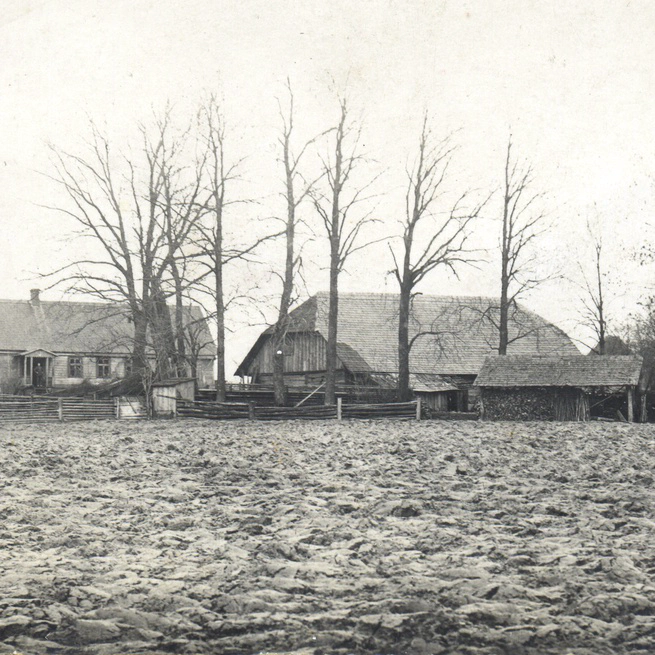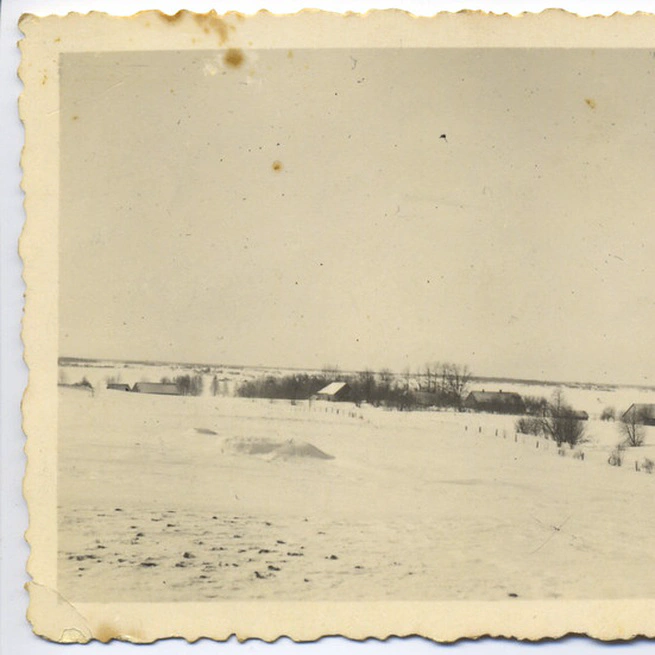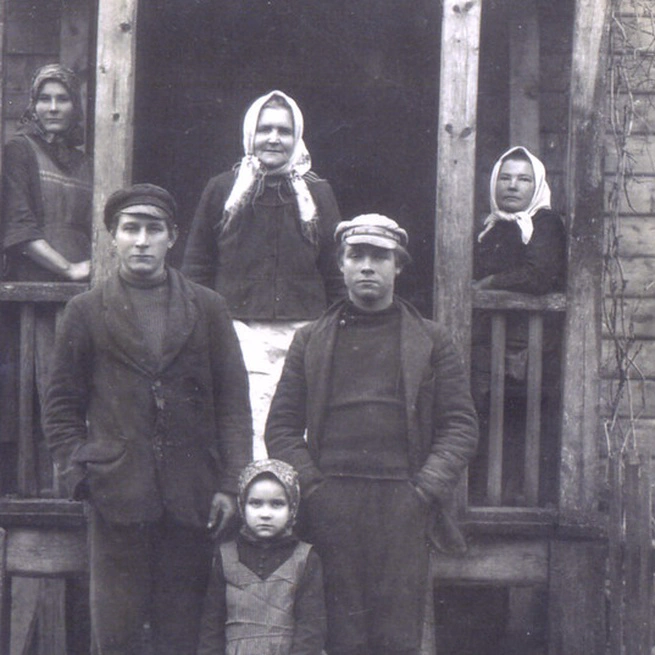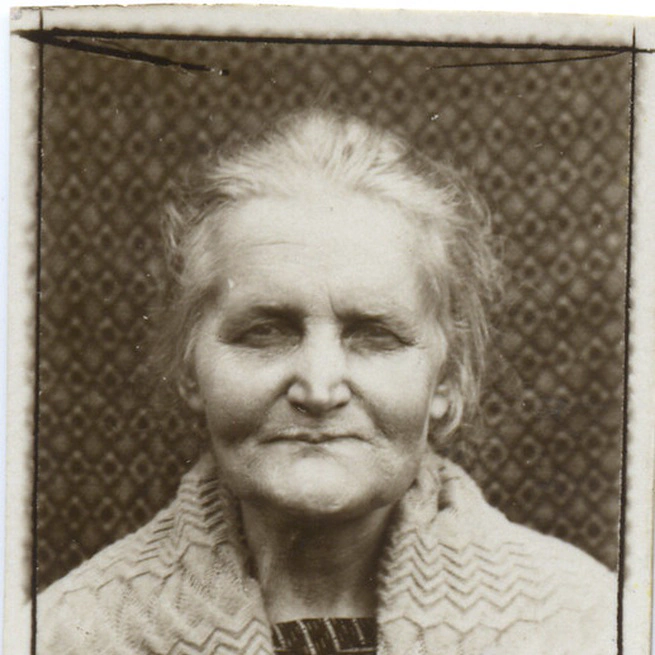This site is based on a memoir written by Augusts Bandenieks, translated by his daughter Aija Moon, and edited by his great grand-daughter Emily Moon.
Italics denote clarifications or notations that were not in the original memoir.

The years will pass; I will not be on this earth. My daughters, or maybe my grandchildren, may become interested in where their father, or grandfather, came from. Thus I am writing my life history.
Jan 14, 2010

As the war neared, father shut the shop. One sunny day at lunch-time father asked me to go and check on the shop to see if everything was in order – no breaking-in or stealing. I had a good look, nothing had been touched. I was just starting for home when I saw the German horse patrol with tall lances held aloft. In fright, I tried to hide behind the building but they had already seen me. They rode around the building from both sides. I was very frightened, I thought that this was my last hour because of the terrible stories that were told about the Germans. They asked – I still remember – “Russe” (“Russian?”) I just yelled that I didn’t understand. By this time the rest of the patrol had arrived; 15-20 men. “Aber here is eine kinder.” (“Here is only a child.”) They all laughed very loudly to see me so frightened with wet running down my legs. Then, the Germans, still laughing, rode away toward Kuldiga. I was very happy to be safe, having survived meeting the Germans face-to-face.
Jan 15, 2010

For the first year of the German occupation during the First World War there were no schools in the country. Somehow, a teacher who spoke German and came from the city had obtained permission to teach Latvian language and writing. She opened a school about three kilometres from our house in a very old building with low ceilings. It had tiny windows and the ceilings and walls were black in smoke. It was one, large, long room with plain tables and benches. In this room crowded fifty children of all ages eight to eighteen. We were divided in groups, the older and the younger. Even the air was hard to breathe. If someone farted and did not admit it, they were checked by sniffing down their collar and then sent out to ventilate. Around this building were wild bushes on the hillside and at the bottom of the hill there were pits where gravel was dug to repair the roads. That is where we played traditional children’s games. The school did not last long. After Christmas, a school was opened in Birze district by a teacher named Janfelds for 50-60 students. Again, it was one large room, but it was light just like a real school.
Jan 17, 2010

They started from the age of six with shepherding pigs in the yard or along the lanes where other animals were guided to the pastures. There was a fence on both sides so my sister Alvine and I just stood at each end of the lane. Time went very slowly, we had to do it for two hours. Next came the shepherding of cows and sheep. I don’t know if it was the same in other parts of Latvia as it was where we were. There were five farms with their buildings close together: Andulas, Digaini, Naglas, Vecvagari, and Zvirbuli. In the middle there was a road only for those properties with a fence along both sides so that the animals could graze along it and be directed to the pastures. The pastures started beyond Andulas. The pastures were common property from ancient times, so all the animals were herded together. The field was a square of about 1 ½ kilometres each side, mostly swampy with some water in places like small lakes. The grass was very coarse and the animals did not like it much. When the five farm animals were combined there were 50-60 cows and 200 sheep. Also, there were five shepherds, usually boys. That is where one learned how to get into trouble. There were some fights with the bigger boys teaching discipline to the younger, first-year beginners. It was the younger ones that got all the hard work – if the animals were going in the wrong direction they had to get them back. The older ones played cards or did their own thing. The younger ones couldn’t complain, it was like the Mafia of today. It was surprising how the animals, on returning to the farms in the evening, each knew to turn into their own yard. At first the calves and lambs would have to be guided. In the spring when the animals were first let out, the older cows, like people, chose a leader. The strongest took on the leadership and got respect. If the battle for leadership got dangerous, the shepherds had to separate them with a whip.
Jan 18, 2010
During 1917-1918 I remember playing war with snowballs at school; reds (communists) versus whites. During this time there was no knowledge of the terrors of the communists, they were considered as saviours from the German oppression. The school was 4-5 kilometers from our place. Three of us from the family went to school: myself, Alvine, and Arturs. In good weather we would walk home. In bad weather and in winter we would stay the night. There was sleeping accommodation upstairs on straw mattresses so close together that they touched. One end of the building was for boys and the other for girls. In the middle there was a dining room, also divided for boys and girls. The main food was rye bread with butter or smoked bacon. For breakfast we would get hot water for coffee or tea. For dinner, potatoes were boiled in a large pot. Each person’s lot was tied in a net with a named string hanging out of the pot. The school’s helper checked the parcels to see if they were cooked, and those that were ready he would put on a shelf. Usually we got them when they were already cold. There was no communal food. In the evenings after dinner for two hours, those that stayed at school went to one large class and did their homework under a teacher’s supervision and with the light from a petrol lamp. There were four teachers, each with a class. It was a Catholic school because the surrounding district was Catholic. There were only 6-7 students who were not Catholic. The Catholic Church was also nearby. A priest taught religion, and I usually stayed in class so that I could learn all the Catholic teachings. The priest would check the students for their knowledge of the texts. Because I was the only non-Catholic in the class I was not asked anything, but I often would whisper the answers when other students did not know. After the First World War there was a great shortage of teachers and country schools only went to fourth year. If you wanted to finish all six years you had to go to the district school in Aizpute.
Jan 19, 2010